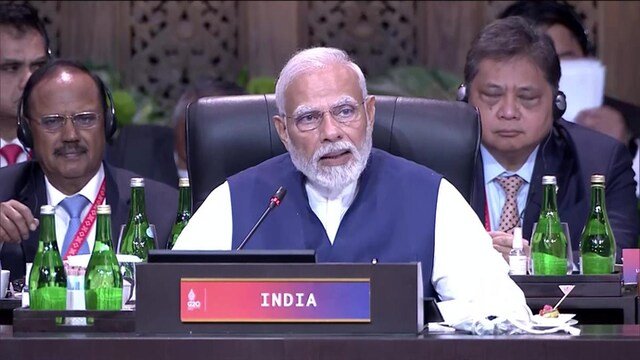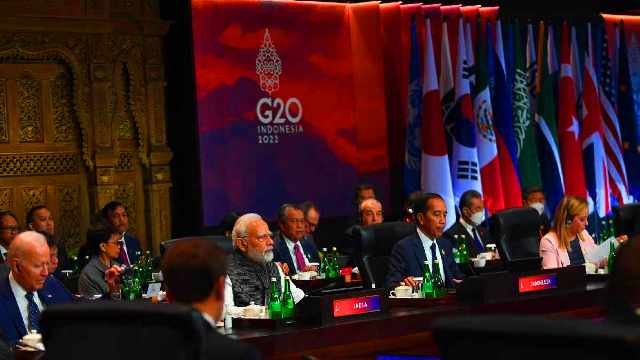Indonesia President Joko Widodo handed over the G20 Presidency to India at the closing ceremony of the 17th intergovernmental summit in Bali on Wednesday. India will officially assume the G20 presidency on December 1. Prime Minister Narendra Modi said at the closing G20 session that taking over the presidency of G20 is a moment of pride for every Indian citizen and LIFE– Lifestyle for Environment will play an important role.
As the G20 presidency was handed over to India by Indonesia, Modi said the country will work for collective action on global challenges such as food and energy security. Indonesian President Joko Widodo banged a gavel and symbolically handed it over to Modi to mark the change of presidency at the closing session of the G20 Summit in Bali.
In an address at the closing session, Modi noted India is taking charge of the G20 at a “time when the world is simultaneously grappling with geopolitical tensions, economic slowdown, rising food and energy prices and the long-term ill-effects of the pandemic”. He congratulated Widodo for his “efficient leadership” of the G20 in difficult times.

Speaking in Hindi, he said: “At such a time, the world is looking at the G20 with hope. Today, I want to assure that India’s G20 presidency will be inclusive, ambitious, decisive and action-oriented.”
“Together, we will make the G20 a catalyst for global change,” he added.
In an apparent reference to global tensions and divisions triggered by the Ukraine conflict, Modi said future generations won’t be able to take advantage of economic growth without peace and security. “The G20 has to convey a strong message in favour of peace and harmony. All these priorities are fully embodied in the theme of India’s G-20 chairmanship – ‘One Earth, One Family, One Future’,” he emphasised.
India will formally begin its presidency on December 1 and host the next summit in New Delhi in September 2023. Modi said India will strive to ensure the G20 “acts as a global prime mover to envision new ideas and accelerate collective action”. The benefits of development should be universal and all-inclusive, and extended to everyone with compassion and solidarity, he said.
Highlighting the role of women in global development, he said, “We have to maintain priority on women-led development even in our G20 agenda.”
Noting that the “sense of ownership over natural resources” is creating conflict, Modi said this is the main cause of the plight of the environment. A sense of trusteeship is the solution for the planet’s safe future and India’s LiFE or ‘Lifestyle for Environment’ can make a contribution in this context.
Modi said it was a “very auspicious coincidence” that India assumed the G20 presidency in “this holy island of Bali”, which has an age-old relationship with India. This is also a proud occasion for Indians as the country will organise G20 meetings in different cities and states.
“Our guests will get a full experience of India’s amazing diversity, inclusive traditions and cultural richness. We wish that all of you will participate in this unique celebration in India, the ‘Mother of Democracy,” he added.
Earlier, Modi told the summit’s session on digital transformation that India’s G20 presidency will focus on bridging the digital divide, especially in developing countries, and ensuring greater benefits from digital technologies.
“The principle of ‘data for development will be an integral part of the overall theme of our presidency, ‘One Earth, One Family, One Future,” he said. India is making digital access public but there is a huge digital divide at the international level and citizens of most developing countries don’t have “any kind of digital identity” while only 50 nations have digital payment systems, he said, speaking in Hindi.
“Can we take a pledge together that in the next 10 years, we will bring digital transformation in the life of every human being, so that no person in the world will be deprived of the benefits of digital technology,” he said.
Digital issues and reforms of multilateral financial institutions are among the focus areas for India’s G20 presidency.
Modi said proper use of digital technologies can be a force multiplier in the global fight against poverty, and digital solutions can aid the fight against climate change. But such benefits will be realised when digital access is inclusive.
“India’s experience…has shown us that if we make digital architecture inclusive, it can bring about socio-economic transformation. Digital use can bring scale and speed. Transparency can be brought in governance,” he said, noting India has developed digital public goods whose “basic architecture has in-built democratic principles”.
These solutions are based on open source, open APIs and open standards that are interoperable and public. Citing the example of India’s Unified Payment Interface (UPI), he said more than 40% of global real-time payment transactions last year were done through UPI. India ensured financial inclusion by opening 460 million new bank accounts using digital identity and the open source CoWIN platform ensured the success of the largest vaccination campaign, he said.

History and Significance of G20
Created in 1999 with the intention of bringing the most significant industrialised and developing nations together to discuss global economic and financial stability, The G20 leaders’ annual meeting, which started in 2008, has grown into a significant forum for talking about economics and other urgent global concerns. Despite the group’s effective involvement in the 2008 financial crisis, its coherence has subsequently deteriorated. For instance, analysts had heavily criticised its mediocre response to the COVID-19 outbreak.
The G20 leaders gather annually to coordinate policies on an array of issues. Examples include the 2009 G20 summit debate about how to deal with a clandestine Iranian nuclear facility and the 2017 summit discussion of how to implement a partial cease-fire in Syria. The G20 is not an organisation with a permanent location, personnel, or offices. Instead, it has a consensus-based decision-making process, a yearly leadership rotation among its members, and depends on the political will of each member state to carry out its goal.
Key issues of G20 Summit this year
In addition to the keynote addresses by world leaders, a range of bilateral talks will take place against the backdrop of ongoing tensions around the world, including those caused by the invasion of Ukraine and the ensuing economic and environmental consequences, the climate crisis, North Korea’s simmering nuclear programme, and China’s expanding global aspirations.
Since the onset of the COVID-19 pandemic, this meeting of world leaders has grown significantly, and Indonesia, the host nation, has created an agenda that sheds importance on renewable energy, global health initiatives, and economic recovery from the pandemic.
What is India’s agenda at G20?
Prior to his arrival in Bali, Foreign Secretary Vinay Kwatra stated on Sunday that Prime Minister Narendra Modi will meet with several global leaders and discuss India’s shifting G20 goals with them.
Indian PM Narendra Modi will take part in three important sessions on food and energy security, digital transformation, and health, according to Kwatra. He and other world leaders will also hold extensive discussions on a number of contemporary burning topics, including the state of the world economy, issues pertaining energy, environment, agriculture, health, and digital transformation.
PM Modi’s G20 logo draws inspiration from the colours of Indian national flag: saffron, white and green, and blue. According to an official statement, it contrasts planet Earth with the lotus, India’s national flower that represents growth in the face of hardship.
Challenge ahead for India
As it takes over the G20 presidency, India has enormous roadblocks to face. Inclusive, equitable, and sustainable growth, women’s empowerment, digital public infrastructure and tech-enabled development, climate funding, global food security, and energy security are just a few of India’s G20 goals, but making them happen is going to be a task for India.
In recent times, the G20’s reputation has taken a hit. It is close to a catastrophe because it is all too clear that there is an internal strife. The West and Russia have refused to agree on anything; they even resisted sitting down and talking about their issues. Thus, India has the tedious job of resolving disagreements and lead from the front.
Meanwhile, US president Joe Biden and Chinese president Xi Jinping will have their first face-to-face meeting as leaders on Monday afternoon in Bali, albeit it is not strictly a G20 meeting. The outcomes of the US midterm elections have given Biden a greater political clout, and he has stated that he would work to set red lines in the US-China relationship that enable competition and coexistence. He’s also expected to issue warning against an invasion of Taiwan and efforts to restrict navigation of the South China sea.
Rishi Sunak, the new British PM, is travelling to Bali to take on his first significant diplomatic test. He is anticipated to draw his attention to the invasion of Ukraine by Russia and to emphasise support for Kyiv.
Additionally, Biden and Sunak will have their first in-person meeting at Bali. US officials have increased pressure on both parties to reach a consensus on the Northern Ireland protocol before the Good Friday Agreement’s 25th anniversary in 2023. Although President Vladimir Putin has pulled out, Russia will be represented by his seasoned foreign minister, Sergei Lavrov.

